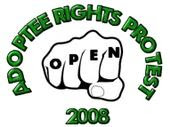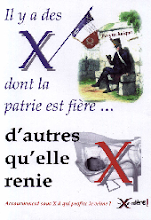 Go to link for sidebar on history of open records, current stats, and pictures
Go to link for sidebar on history of open records, current stats, and picturesTom Atwood steps in the cow pie.
USA TODAY
February 13, 2008
As Adoptees Seek Roots, States Unsealing Records
By Wendy Koch, USA TODAY
When Maine state Sen. Paula Benoit got a bill passed last year, she got more than a new law: She found pieces of her past.
For years, Benoit, 52, had wondered about the parents who had put her up for adoption. That helped lead her to support a plan to give adult adoptees access to their original birth certificates. After the bill passed, Benoit learned the names of her birth parents and their hometown. She e-mailed a colleague, Sen. Bruce Bryant, who represents that area and supported her bill, and asked whether he knew them.
His reply: The deceased couple were his grandparents.
"Oh, for the love of God, I need to call him and say, 'I'm your aunt,' " Benoit recalls thinking. "Can the world be any smaller?"
There was more: Bryant's brother, Mark, serves in Maine's House of Representatives — and had opposed Benoit's bill. "It's too open," he says, adding that birth mothers expected privacy when they placed children for adoption years ago. He says he's happy Benoit is in his family but worries the new law may force some birth parents into contact they do not want.
Three lawmakers, two points of view, one family.
As unusual as Benoit's story is, the debate within her family over whether adult adoptees should be able to learn more about their backgrounds is echoing across the nation.
Last year, Maine was one of three states to pass laws to give such adoptees full or partial access to their original birth certificates — more than in any year since 2000, according to a USA TODAY analysis of state records. Massachusetts approved access for those born before July 1974, when records were sealed, or after January 2008. North Carolina approved indirect access through a state-appointed intermediary. When its law takes effect next January, Maine will become the eighth state to give adult adoptees full access to their birth records, which list birth parents' names.
The controversial push to open adoption records is driven in part by the increased interest among many Americans in finding their ancestral roots. Many adult adoptees may be able to find their birth parents without an original birth certificate by searching databases and the Internet, but the official record makes it easier. Some adoptees want to establish a relationship with birth parents; others are more interested in family medical histories. Some don't want to contact their birth parents, they simply want to know their past.
"For 52 years, I know I've been loved," Benoit says of her adoptive parents, who are alive and support her desire to know birth relatives. Even so, she says, she wondered whom she looked like. She wondered why, despite diet after diet, she couldn't lose weight. "Does obesity run in my family?" she'd ask herself.
"This is really about identity and the truth of a human being's existence," Darryl McDaniels, known as the rapper DMC, told lawmakers last month in New Jersey, where bills to open birth records have languished for decades. McDaniels, 43, learned at 35 that he was adopted and has since backed a bill to unseal birth certificates.
"We never start a book from Chapter 2," he said. "As adoptees, we live our lives from Chapter 2."
As the situation in New Jersey suggests, unsealing birth certificates often has been difficult. Bills to do so were proposed in at least seven other states last year but did not pass. Some proposals, such as those in New Jersey, have been stymied by opposition from the National Council for Adoption and some Catholic bishops, abortion opponents and civil libertarians.
Thomas Atwood, president of the council, which represents adoption agencies, says birth mothers were promised privacy and if that promise is broken, fewer women will choose adoption over abortion.
Despite the opposition, "the general trend is clear: Adoptees are being given access, state by state," says Fred Greenman, legal adviser to the American Adoption Congress, which supports open birth records.
Greenman reconnected with his daughter in 1991, more than 30 years after agreeing to her adoption. The daughter's husband made the first call and set up a meeting. "We spent the whole day at the dining room table talking," he recalls. He says most birth parents welcome contact, as he did, and adoptees deserve to know their past.
Last year's increase in access laws also reflects a larger trend toward openness in adoption, as more birth parents seek to stay in contact with kids they relinquish. "There's far more acceptance of it being open," says Herbert Brail, head of the American Academy of Adoption Attorneys.
That was not the case decades ago when many women, under the stigma of unmarried pregnancy, felt forced to relinquish their babies, says Ann Fessler, author of The Girls Who Went Away, a 2006 book about women who gave up children in the 1950s and 1960s.
Fessler, an adoptee, says many of the women she interviewed have "tremendous guilt." She says they want contact with their children, and about half have it. The rest, she says, feel they have no right to it but wonder about their children.
Fessler, 58, says women in their mid-70s and 80s, are — like her own birth mother — often more reticent about a reunion. She wrote her 77-year-old mother a letter, then a postcard, and waited more than a year but got no response. So she called. "I was very, very nervous — kind of shaking," she says. Her mother was friendly on the phone, so they met in person a few months later. "We chatted like crazy," Fessler says.
Now, however, they have "minimal" contact. Her mother has not told her other three children about Fessler. "She's still torn about whether she can come out about this," Fessler says.
Eileen McQuade, president of the American Adoption Congress, says unsealing birth records has not created problems in the states that have done so — Alabama, Delaware, New Hampshire, Oregon and Tennessee. Two other states, Alaska and Kansas, have never sealed birth records. Delaware allows full access except when birth parents object.
Abortion rates have declined in the states that allow full access to records, as they have nationwide. Most birth parents in Alabama, New Hampshire, Oregon and Tennessee have consented to contact with their children or the release of records, according to records reviewed by USA TODAY.
After Oregon began releasing records in 2000, few birth mothers complained, says E. Wayne Carp, author of Adoption Politics: Bastard Nation & Ballot Initiative 58, a book on the state's experience.
As each state opens records, others will follow, says Adam Pertman, executive director of the Evan B. Donaldson Adoption Institute, which favors unsealing records. "Success breeds success."
A battle of legal rights
The legislative battles often pit an adoptee's right to his or her birth certificate against a birth mother's right to privacy.
"People have a right to their birth records," says Marley Greiner, founder of Bastard Nation, a group pushing to unseal records.
There is no such legal right, Atwood counters, adding that birth mothers believe they were promised privacy when states sealed records. He says many won't speak out because they have other kids or spouses who don't know about the adoption.
Birth records were sealed not to give birth mothers anonymity but to protect adoptive parents from interference from birth parents, says Elizabeth Samuels, a professor at the University of Baltimore School of Law. She says some were sealed to protect adoptees from the stigma of illegitimacy.
If birth mothers or adopted children really want to find each other, Atwood says, they can list their names in registries set up by states.
Not all states have registries. Many that do make few matches, says Marri Rillera of the International Soundex Reunion Registry, which gives adoptees and birth parents free help in finding each other. In Texas, about 8,500 adoptees, siblings and birth parents have registered. One or two matches are made each month, says Patricia Molina, who oversees the registry.
"A registry is not the answer," Rillera says. "Open records are."
She says some companies charge thousands of dollars to search records and some adoption agencies charge $400 to $500 for non-identifying information about birth parents, such as age, medical history, ethnicity and religion. An adoptee's search will be quicker and cheaper if birth records are open, she says. "Frankly, I'd like to be out of business."
'We've had mixed emotions'
At least 19,000 adoptees have asked for their birth certificates in Alabama, Delaware, New Hampshire, Oregon and Tennessee.
"I've seen a lot of people whose hands shake" when they get the record, says Melanie Orman, adoption coordinator for New Hampshire. She says many had met their birth mother or knew her name but wanted the piece of paper as a record of their past.
Birth mothers can be distressed. Orman got a call from an angry woman who said she was awakened at 11 p.m. by a call from someone who said, "You're my mother." She says the woman felt her privacy had been invaded.
"We've had mixed emotions: happy, sad, upset," says Carolyn Jones, coordinator of post-adoption services at the Tennessee Department of Children's Services.
Adoptees seeking birth certificates is "routine now," says Carol Sanders at Oregon's Center for Health Statistics. From June 2000 through November 2007, 9,571 adoptees sought records in Oregon. Of 564 birth parents who filed forms on whether they wanted contact, 85 said no.
"I've seen very few who say no," says Dorothy Harshbarger, Alabama's registrar of vital records. She estimates 95% of birth parents allow contact. She says a few complained after records were unsealed in 2000, but not many since then.
A dozen states provide partial access to original birth certificates, depending on the date of the adoption and the permission of birth parents. Another dozen allow indirect access through a state-appointed intermediary if birth parents agree. In other states, adoptees need court approval.
In Illinois, which allows access via an intermediary, 25% of the parents decline contact, says Nancy Golden, co-director of the Midwest Adoption Center, a group that does adoption counseling. She says the women may have kept the birth a secret or may fear anger from the adoptee. She says reunions usually are positive if people don't expect too much. Still, she says the experience can be "overwhelming."
Illinois state Rep. Sara Feigenholtz, who plans to sponsor a bill this year to fully open records, says she was in her 20s when she found her birth mother. The woman's first response: "What took you so long?"
McQuade was 19, a college freshman, when she relinquished a baby girl in 1966. "I felt so powerless and shameful," she recalls. She later married the father and had two more daughters, but they didn't discuss their first child. "We hoped the pain would go away," she says, "but it never did."
Then came the phone call on Nov. 28, 1997, about 9:30 p.m. "I'm calling from New York," a woman said. "I knew what it was immediately," McQuade recalls. The caller, a friend of her first child, asked if the parents wanted contact. They did. The friend handed the phone to the daughter.
Mother and daughter spoke for the first time, neither sure what to say. McQuade started by telling her family medical information.
"It was kind of indescribable — terrified, excited, surreal," says her daughter Kathleen Laing. "We e-mailed every day for a year. It was incredibly intense."
They met in person the following July 4th weekend. "It was a complete roller coaster," McQuade says, from joy and hope to sadness at missing so many years. She says their reunion is "a fairy tale come true" that prompted her activism.
Benoit says that after she began pushing to unseal Maine's birth records, she asked a judge for her own. He said no. Later, to her surprise, she received a letter from the court that included her birth mother's name. She still does not have her original birth certificate.
She says the Bryants invited her to a Christmas party and other get-togethers. "Our family is happy to know her," Mark Bryant says.
Benoit says her birth mother was poor and about 50 when she was born, and did the right thing in relinquishing her baby. If her birth mother were alive, Benoit says, "Boy, would I love to put my arms around her and thank her."
Link to article








No comments:
Post a Comment